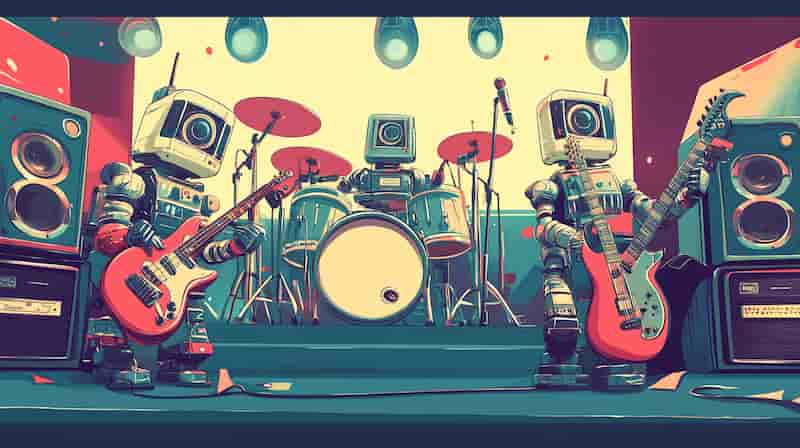
The intersection of artificial intelligence and creativity has been the hottest topic of discussion in recent years. Supporters of innovation argue that content generation will not make real art disappear, just as photography did not replace paintings, and cinema did not replace theater. However, skeptics believe that neural networks are capable of completely destroying creativity.
The influence of neural networks is especially noticeable for generating music and vocals. To create new musical compositions and perform them, you do not need to have talent, hearing, or voice. It is enough to come up with a theme, set the rhythm, tonality, and you can get a ready-made track with lyrics. And the ability of technology to generate vocals that are indistinguishable from the human voice opens up new opportunities for producers and performers. How does a neural network work in music creation Generators with built-in artificial intelligence use various algorithms to create complete musical works from scratch based on deep learning. The model is trained on millions of compositions, identifies patterns and regularities. As a result, it creates unique musical materials without similar fragments. Generated works can be used as backing tracks, backgrounds for videos or video games, soundtracks for films, for live performances.
Advantages of using neural networks in musical creativity Generating music using a neural network primarily reduces the cost of creating musical content. Recording equipment and instruments are expensive, while programs are cheaper, and many services provide a free trial period. And even with a limited budget, you can create professional sound for various projects. Let’s consider other advantages of artificial intelligence in music production.
Creating original and unique compositions Real composers prefer to do creative work the old-fashioned way - they wait for inspiration, sit down at the instrument, take a staff and start composing. But if you need a composition for the background of a video, commercial, computer game, then it is much easier and faster to use a neural network to generate music. A masterpiece is unlikely to come out, but the composition will be completely unique, and no one will accuse you of plagiarism.
Automatic creation of music based on specified parameters AI algorithms can generate tracks based on specified parameters. You can even train the model using your compositions as an example so that it better understands your signature style and can imitate it.
To make the composition match your requests, you can specify:
- genre - jazz, pop, rock, folk;
- tempo - slow, medium or fast;
- key;
- structure and length of the track;
- emotional coloring;
- instrumentation and arrangement.
You can ask the neural network to add special effects to give the composition unique features. For example, reverberation will create a sense of space and depth, an equalizer will change the tonal balance and frequency characteristics, modulation will add interesting textures and shades of sound.
Reducing the time spent on creating musical material Using neural networks significantly reduces the time spent on writing music. Instead of spending hours on composing and arranging, you can get a finished track in a few minutes. This is especially useful for professionals working under tight deadlines.
How to start using neural networks to create music To better understand how neural networks work, study the basics of machine learning. Test platforms with integrated AI designed for writing music tracks. This will help you choose the best neural network to generate music according to your requirements.
To get the desired result, try different program settings, set specific parameters, use the necessary tools. For the final version, you can integrate the results into your creative process. Edit the track, make an original arrangement, add signature techniques.
The role and impact of neural networks on the music industry and culture in general Generation using neural networks is a promising direction. Writing new music is becoming more accessible. To create high-quality tracks, you do not have to be a professional composer or buy expensive equipment for a recording studio. Composers and producers can focus on the creative part of the work, and leave routine tasks to the neural network. Automation leads to lower costs and increased productivity.
However, there are still some problems. It is difficult to determine the authorship of generated music content and protect intellectual property. It is also worth remembering that music is an art form that establishes an emotional connection between the performer and the listener. Vocals and compositions generated by AI are technically perfect, but they lack the soulfulness that only a human can infuse into creativity.
When creating music, it is important to maintain a balance between

